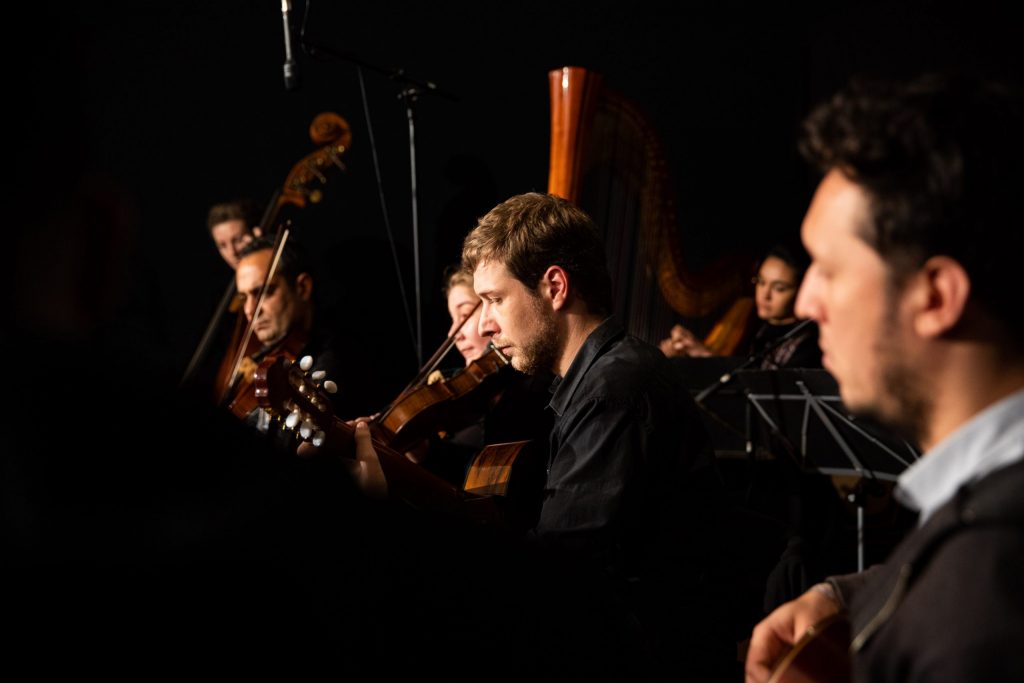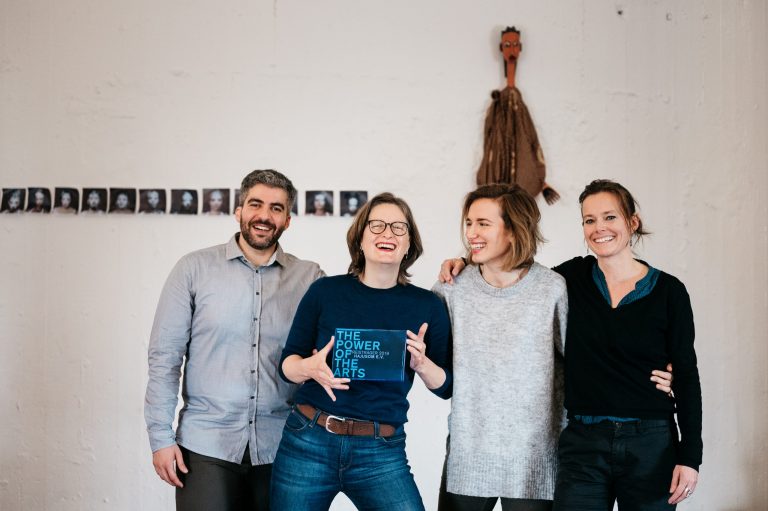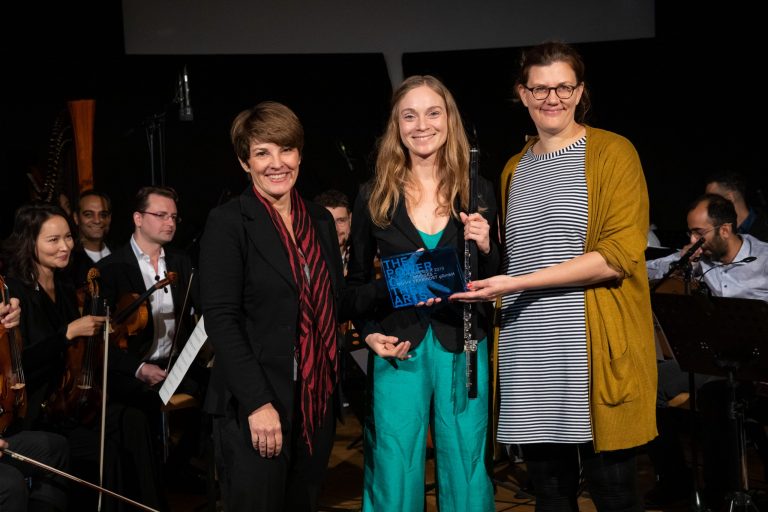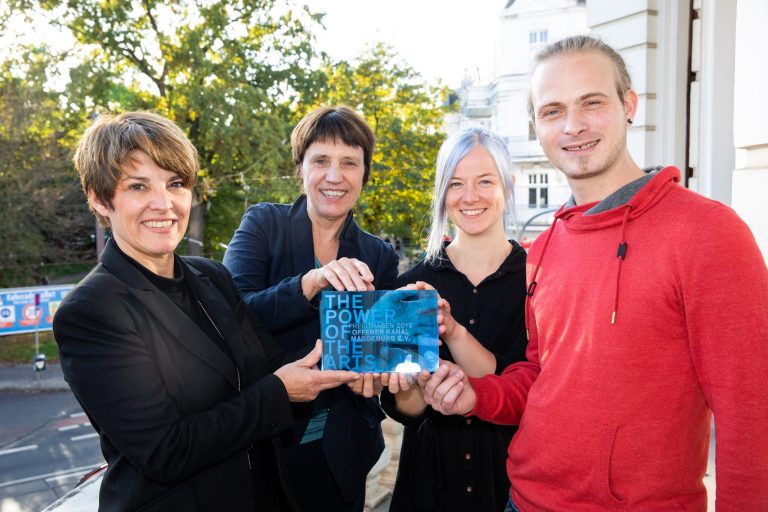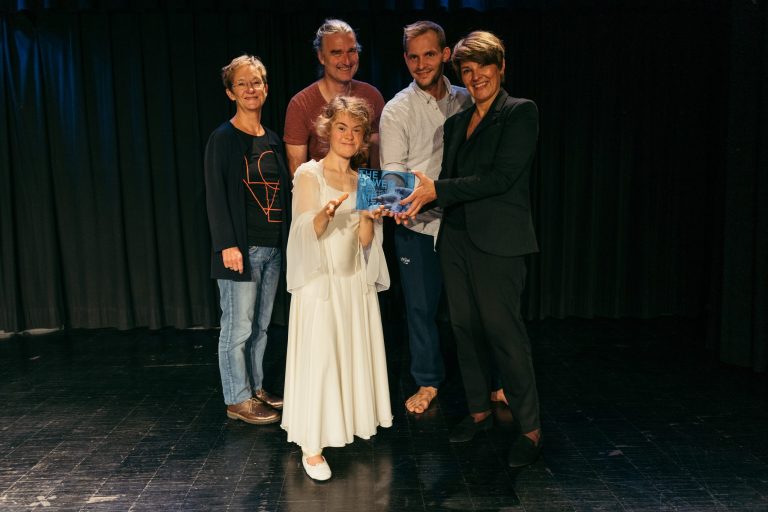The awardees 2019
For the third time since the founding of The Power the Arts, the jury has once again selected impressive projects to receive the award.
2019 is the third year of The Power of the Arts, which is one of Germany’s most highly endowed awards in the field of arts and culture with a total of 200,000 euros in funding. This Philip Morris GmbH initiative supports projects advocating for an open society and a “new we” by the means of culture and the arts. More than 100 non-profit initiatives applied this year. These four projects were selected by the jury to receive 50,000 euros each:
- Hajusom e.V., from Hamburg
- BRIDGES – Music unites, from Frankfurt
- Offener Kanal Magdeburg e.V., from Magdeburg
- DieTanzKompanie at Esslingen’s Dieselstrasse Culture Center
As Elfriede Buben, Head of Corporate Responsibility at Philip Morris GmbH,emphasizes:
“We have the great fortune to be living in a society that has never been as versatile and liberal as today. And yet, current debates show that this status is by no means undisputed. That is why it is more important than ever to carry on this initiative. It is a joy to once again award four projects whose engagement is exemplary for our open society despite a wide array of resistance.”
About the winning projects:
Hajusom e.V., from Hamburg
Since 2010, the Hamburg artist initiative Hajusom e.V. has been implementing artistic projects with unaccompanied refugees. As a center for transnational arts, Hajusom combines artistic quality, political activism, and social engagement. They are awarded particularly for a newly developed video performance project.
The jury’s assessment: “The Hajusom Project dares to take a step towards the future, bringing different communities together for the first time, not only making discrimination visible, but above all encouraging self-reflection among all of society. These artists succeed in using humor and irony to address issues currently subject to controversial debate, such as discrimination and integration. This kind of emancipative-innovative approach would also be good for current public discourse.”
BRIDGES – Music unites, from Frankfurt
Bridges brings together musicians with and without migration or refugee background to create and perform music together. More than 130 music enthusiasts from 25 countries have already formed various ensembles and played more than 230 concerts. The award-winning Bridges Chamber Orchestra is to become a permanent institution. It comprises locals, migrants and refugees to one third each, with a common goal: They strive to become THE orchestra reflecting Germany in its diversity and cultural richness.
The jury’s assessment: “As a ‘democratic orchestra’ of outstanding musicians, the Bridges Chamber Orchestra is virtually a symbol for an alternative way of social cohabitation, holding great potential to serve as a model: The orchestra creates a common sound from their differences, and a mutual experience for the beauty of music. This is also a wish for society as a whole.”
Offener Kanal Magdeburg e.V., from Magdeburg
Offener Kanal Magdeburg is a free broadcaster supporting different social groups in producing film and television. The aim is to strengthen local communication and to create a broad audience for the concerns of various strata among the population. The award is dedicated to the film project Magdeburg Moritzplatz. Moritzplatz is a public square in Magdeburg’s district Neue Neustadt and a social flashpoint. The film project consists of three seasons and tells stories from the life and experiences of the people living there. Around 80 young local immigrants and refugees are involved in the production. The project will focus on topics such as the clash of cultures and sub-cultures, the loss of home, and the search for orientation and identity.
What the jury has to say: “The project Magdeburg Moritzplatz combines political and cultural work in a contemporary format, resonating with a broader audience. It provides insight into a microcosm that is representative for many other places all over Germany. The storytelling is designed to shed light on the participants and the realities they live in, to meet them on eye level, and to show new narrative perspectives that are most urgently needed.”
DieTanzKompanie at Esslingen’s Dieselstrasse Culture Center
Dance and so much more. Professional dancers with and without disabilities are redefining dance. They can be found on stage Esslingen’s Dieselstrasse Culture Center in solo performances, duos, and groups. French choreographer and filmmaker Gregory Darcy is founding a new dance company, featuring high-quality performances to create awareness among audiences for the subject of disability and dance. This implies addressing social questions of perfection, acceptance, being different, and notions of beauty. In connection with various kinds of disability, new styles of human motion and dance are created, accompanied by live composition. And all of this with professionals and semi-professionals in both music and dance.
What the jury has to say: “To dance is to touch, it’s another form of speaking. Here, people with and without disabilities can develop new and innovative forms of expression in the world of dance – such as extrapolating the concept of sign language to become a dance form. The fact that this project is also specifically dedicated to performing in rural areas makes it exceptional on a progressive level and gives hope that it will serve as inspiration for others.”

